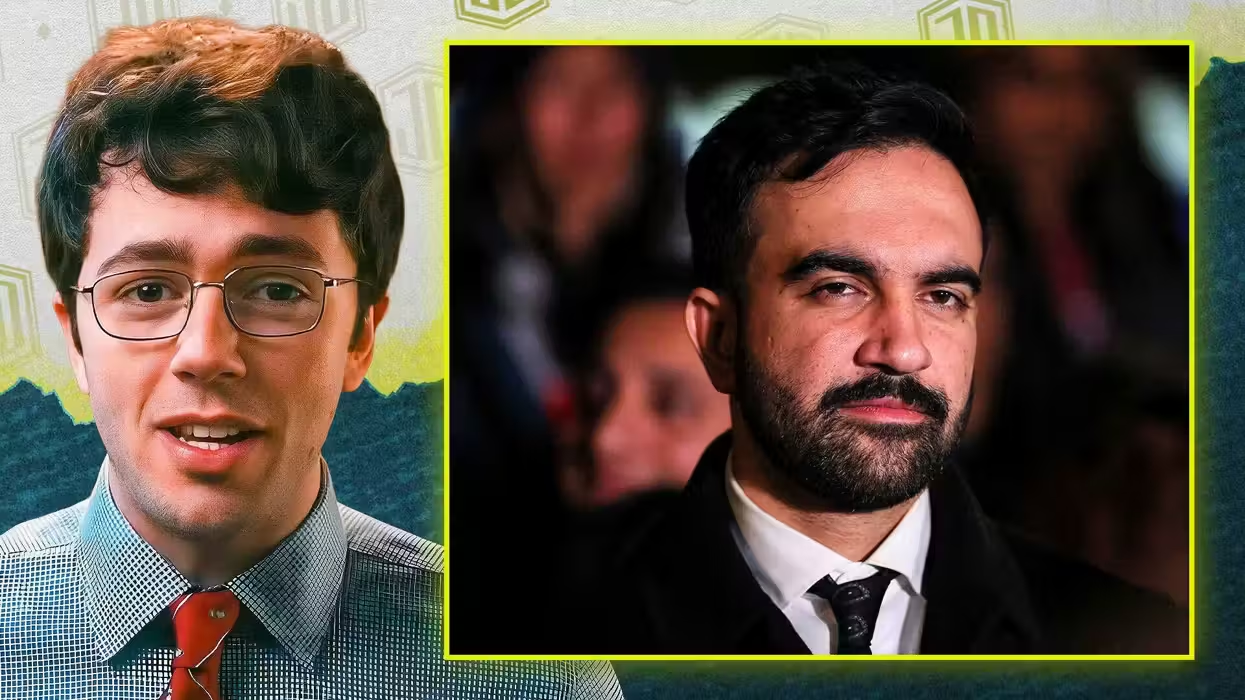
© 2025 Blaze Media LLC. All rights reserved.
"Not one person in skating I've talked to said that's the way it should have gone."
The results of figure skating, where medals are issued as the result of expert judging and a scoring system rather than a finish line, can be the subject of skepticism. It has happened at the Olympics before, and now it's happening at Sochi after Adelina Sotnikova skated away with the gold medal for Russia and some question how she beat a near-perfect performance by South Korea's Yuna Kim.
 Adelina Sotnikova of Russia, centre, Yuna Kim of South Korea, left, and Carolina Kostner of Italy stand on the podium during the flower ceremony for the women's free skate figure skating final at the Iceberg Skating Palace during the 2014 Winter Olympics, Thursday, Feb. 20, 2014, in Sochi, Russia. Sotnikova placed first, followed by Kim and Kostner. (AP/Ivan Sekretarev)
Adelina Sotnikova of Russia, centre, Yuna Kim of South Korea, left, and Carolina Kostner of Italy stand on the podium during the flower ceremony for the women's free skate figure skating final at the Iceberg Skating Palace during the 2014 Winter Olympics, Thursday, Feb. 20, 2014, in Sochi, Russia. Sotnikova placed first, followed by Kim and Kostner. (AP/Ivan Sekretarev)
Ashley Wagner, a figure skater representing Team USA who isn't shy about showing what she thinks of judges' scores, told NBC's Today Show while she thinks all the medalists deserved their top places, judging is "too opaque."
“I think we need to get rid of the anonymous judging," Wagner added.
The Today Show conducted a poll and found 60 percent of respondents disagreed with the results of women's figure skating.
But the International Olympic Committee is already dialing back criticism after social media was ablaze Friday with questions and accusations, particularly from South Koreans who saw Kim denied a second straight Olympic title. Others wondered about the makeup of the judging panel, which included an individual who was once banned from judging and another who would seem to have an apparent conflict of interest.
 Yuna Kim of South Korea wipes her face as she attends a news conference following the women's free skate figure skating finals at the Iceberg Skating Palace during the 2014 Winter Olympics, Thursday, Feb. 20, 2014, in Sochi, Russia. (AP/Darron Cummings)
Yuna Kim of South Korea wipes her face as she attends a news conference following the women's free skate figure skating finals at the Iceberg Skating Palace during the 2014 Winter Olympics, Thursday, Feb. 20, 2014, in Sochi, Russia. (AP/Darron Cummings)
"I think you're getting a little ahead of yourself," IOC spokesman Mark Adams said, according to USA Today. "I think first off we have to see if there's an official complaint, because the people concerned I'd assume would make a complaint and it would go to the federation. I'm not aware there's been such a complaint and if there was they'd got through the federation. I don't think it's even happened yet. If it does that will be the first step to go through if there isn't a credible complaint we wouldn't take it any further."
"I think we need a little of a reality check here," he continued. "I don't know much about skating I saw some of it last night and her performance was agreed by many to be absolutely fantastic. I'm not an expert. The IOC has a pretty sophisticated judging system with safeguards in place and each of the judges has a video review where they can review each of the jumps so there's a number of things in place. At this stage, I think we're discussing purely hypothetical things and my personal point of view would be to congratulate a fantastic performance.
"I think it's the federation which chooses the makeup of the panel and it's clear there's no hiding who's on the panel. I don't think as yet, the first step would be for someone to make some kind of complaint which hasn't happened as far as I know."
Watch Adams make his points in a press conference:
Under the current points system, adopted after the judging scandal at the 2002 Salt Lake City Games, 17-year-old Sotnikova achieved exactly what she needed to come out on top.
"Today's figure skating comprises those evaluations that include a program, steps, jumps," Sotnikova's coach, Elena Buyanova, said Friday. "We were not behind in our complexity, rotations, and I think we should be proud of our two girls because they did not give in to the world elite."
Watching from his NBC broadcast location, 1984 Olympic champ Scott Hamilton was intrigued by the 17-year-old Sotnikova's strategy, which he said worked perfectly for the scoring format. It was more than enough to beat Kim and Carolina Kostner, whose bronze medal was the first in Olympic singles figure skating for Italy.
"Adelina collected more points. That is really the only way you can describe it," Hamilton said. "If you look at Yuna of the past, this was not a program as difficult as she has done, and she left the opportunity for someone to collect points on that side of the scoring.
 Adelina Sotnikova of Russia competes in the women's free skate figure skating finals at the Iceberg Skating Palace during the 2014 Winter Olympics, Thursday, Feb. 20, 2014, in Sochi, Russia. (AP/Ivan Sekretarev)
Adelina Sotnikova of Russia competes in the women's free skate figure skating finals at the Iceberg Skating Palace during the 2014 Winter Olympics, Thursday, Feb. 20, 2014, in Sochi, Russia. (AP/Ivan Sekretarev)
"It may not have been as beautiful as Yuna and Carolina, but under the rules and the way it works, she did all that. ... I think it was a just strategy that worked on the night."
It was a strategy based not so much on artistry but on technical superiority. Nothing in the rules says the program must be an artistic masterpiece. Some observers called Kostner's "Bolero" just that Thursday night. Just check off the boxes: great coverage of the ice, connection between steps, execution that is powerful.
Sotnikova did that, although her margin of victory of nearly six points was shocking.
Still, it hasn't stopped experts from criticizing it. Here's more on that front from USA Today:
"It's sad that I just presumed Sotnikova was going to get a boost (in points) because this was in Russia," former U.S. Olympic figure skating coach Audrey Weisiger said in a phone interview. "Isn't it sad that I automatically thought that? Not one person in skating I've talked to said that's the way it should have gone.""I was surprised with the result," Joseph Inman, a top U.S. international judge who was on the women's panel at the 2002 Olympics, said in a telephone interview.
"That's not fair to see Carolina and Yuna, who have great skating skills and had great skating tonight -- good jumps, nice presence on the ice, maturity, expression -- could be six points behind somebody who has tremendous skill but is just coming out of juniors," said Gwendal Peizerat, the 2002 ice dancing gold medalist from France, who is a television commentator here.
"Compared to Carolina, compared to Yuna, something has happened."
Eteri Tutberidze — coach of 15-year-old Russian Julia Lipnitskaia, who overshadowed Sotnikova until the last two days — fully supported the outcome.
"Later at night, I watched on TV and Sotnikova was an absolute champion for me," said Tutberidze, whose skater finished fifth. "It was a presentation of her life. I have never seen her before be so concentrated and skate every element so neat. ... Emotions, jumps, rotations, spins, spirals, and if you combine all these elements, Adelina won overwhelmingly."
Finding the correct elements is a challenge for everyone: skaters, coaches and choreographers. There is so much gray area in this scoring system, just as there was in the old 6.0 format, that even when the athlete's strengths mesh perfectly with the music, there's never any certainty the judges will be impressed.
So upsets happen.
 Carolina Kostner of Italy competes in the women's free skate figure skating finals at the Iceberg Skating Palace during the 2014 Winter Olympics, Thursday, Feb. 20, 2014, in Sochi, Russia. She ended up taking home bronze. (AP/Darron Cummings)
Carolina Kostner of Italy competes in the women's free skate figure skating finals at the Iceberg Skating Palace during the 2014 Winter Olympics, Thursday, Feb. 20, 2014, in Sochi, Russia. She ended up taking home bronze. (AP/Darron Cummings)
"It's so hard to find the ideal system that would work for everyone, when it comes to even making the rules of figure skating," said Peter Tchernyshev, who won five U.S. ice dance titles under the 6.0 formula. "It's not track and field when you ran faster. Or lifted more weight. Or jumped higher. Again, it's very subjective, yet this sport is surviving over so many years because everyone realizes it's very athletic.
"As I said before, somebody likes more athletic, somebody likes more balletic figure skating. Who's right? Who's wrong?"
Is there even a right or wrong? Judging, after all, comes down to expert opinions.
Associated Press and the AP's Leonid Chizhov contributed to this report.
Want to leave a tip?
We answer to you. Help keep our content free of advertisers and big tech censorship by leaving a tip today.
Want to join the conversation?
Already a subscriber?
more stories
Sign up for the Blaze newsletter
By signing up, you agree to our Privacy Policy and Terms of Use, and agree to receive content that may sometimes include advertisements. You may opt out at any time.
Related Content
© 2025 Blaze Media LLC. All rights reserved.
Get the stories that matter most delivered directly to your inbox.
By signing up, you agree to our Privacy Policy and Terms of Use, and agree to receive content that may sometimes include advertisements. You may opt out at any time.






